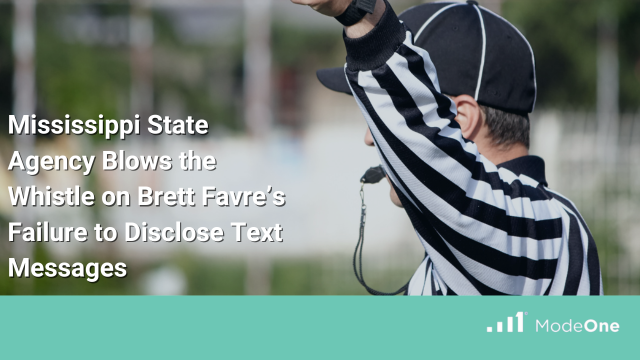By Jason Purviance, Chief Information Officer
Discovering text messages on smartphones is a standard part of civil and criminal litigation for the parties to secure evidence supporting their trial strategy. In a case involving a scheme to divert federal welfare money to build a volleyball stadium at the University of Southern Mississippi, over forty defendants produced more than 330,000 documents, including text messages, to the Mississippi Department of Health Services (MDHS). Still, one defendant, retired National Football League player Brett Favre, produced only 24 documents, none of which contained text messages requested by MDHS. Yet, Favre appears to have thrown deep into the stadium project.
The Mississippi Today, a small nonprofit news site, first reported in 2022 that text messages spanning several years surfaced about the project when MDHS filed suit in Hinds County Circuit Court, Mississippi, against the Mississippi Community Education Center and several defendants, including Favre. The text messages aim to show that then-governor Phil Bryant attempted to spearhead a proposal to use welfare funds to construct the new volleyball stadium. Still, Favre claims he cannot verify the authenticity of many of the text messages.
In a 2017 text message regarding a proposal to direct payments of $1.1 million to Favre for promotional efforts to build the stadium, Favre wrote, “If you were to pay me, is there any way the media could find out where it came from and how much?”
Former governor Bryant and Favre deny any knowledge of welfare funds diverted to the stadium project, which has emerged front and center of a criminal scandal in which prominent officials misspent or stole millions in welfare funds. MDHS stated on August 12, in a 14-page filing, that Favre “failed to answer any of the discovery” relating to his text messages with others involving the alleged scheme to steer welfare funds to projects associated with Favre or promoted in his name.
MDHS’s request for admissions sought to authenticate text messages attached as exhibits to motions in the case. Although the request identified Favre as the recipient or sender of the texts, he objected and claimed he could not verify them.
Out of Timeouts
Favre has no timeouts remaining to complete discovery unless he has a justifiable excuse or explanation for not answering MDHS’s discovery requests before the clock ran out. According to the MDHS filing, Favre was unsuccessful in appealing the Circuit Court’s order denying his motion to dismiss and failed to ask for an extension of time to answer discovery.
The Circuit Court has broad discretion to address Favre’s repeated ignorance of discovery deadlines and failure to respond to discovery timely. The default could render MDHS’s requests for admission admitted, waive Favre’s right to object to interrogatories and the agency’s second set of requests for production, and impose additional discovery costs on Favre if MDHS must obtain the evidence elsewhere.
Under Rule 37(d) of the Federal Rules of Civil Procedure and most state court rules, a court can impose sanctions on a party for a total failure to respond to a request for production or serve answers or objections to interrogatories. Under Rule 37(e), if a party acts in bad faith by failing to preserve text messages when preservation was feasible, they would be subject to sanctions unless they failed to produce any text messages from either the routine operation of his phone’s service provider or the regular good-faith maintenance of their phones. Still, a court can impose sanctions if a party fails to discontinue the automatic deletion feature of its computer system once litigation becomes foreseeable.
Suppose Favre and his defense team want to reverse course and respond to MDHS’s discovery requests immediately. They can “ditch the collection kit” and use ModeOne’s smartphone data discovery technology. Through its patented SaaS framework, ModeOne offers remote, same-day collection of targeted data from Apple iOS and Android mobile devices located anywhere worldwide. A targeted data collection would alleviate privacy concerns caused by over-collection, and reduce costs, expediting the time to review the relevant collected data.
